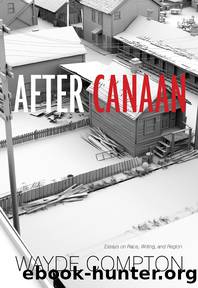After Canaan by Compton Wayde;

Author:Compton, Wayde;
Language: eng
Format: epub
Tags: Essays, Multiculturalism, Post-racialism
ISBN: 634469
Publisher: Arsenal Pulp Press
Published: 2010-12-17T00:00:00+00:00
Jacobs asserts that the corrective for slum conditions lies in the communities themselves, which need âencouragement rather than destructionâ (1961, 271). She points out that, âthe people who do stay in an unslumming slum, and improve their lot within the neighbourhood [â¦] seem to think that their neighbourhood is unique and irreplaceable in all the world, and remarkably valuable in spite of its shortcomings. In this way they are correct, for the multitude of relationships and public characters that make up an animated city street neighbourhood are always unique, intricate and have the value of the unreproducible originalâ (279). It is also important to note that Jacobsâ model is different from gentrification in that it advocates the public funding of improvements that benefit the class already living there, rather than the encouragement of upscale development that will ultimately price out locals. Both Jacobsâ criticism of paternalism and her notion of long-time residents especially valuing a potentially unslumming slum is echoed by Dorothy Nealyâs statements about the implementation of the Marsh Plan and its impact. In an interview, Nealy says,
When we heard of city councilâs plans for the neighbourhood, we were horrified, we just screamed. They intended to put high-rises all over here, like the West End. But the people that lived here, we just took up a petition. We got thousands and thousands of names. And we stopped them. The Vancouver Resources Board met with city council and they met with different organizations. They met with SPOTA. You see, it wasnât just SPOTA that fought for this East End. There was the churches and all kinds of people got involved. The whole neighbourhood got involved. Because we were satisfied with our neighbourhood. But the people from outside came in, and told us we shouldnât have these houses, we should live in housing projects, we should live in high-rises. But what was wrong with living here? They didnât live here, I donât know what they were so worried about. As I said, Iâve lived here for thirty-three years. I wouldnât want to live anyplace else. But somebody comes over from Dunbar district, looking down their nose at this end of town. Itâs just like the Christians going to Africa, trying to convert you to Christianity when you already have your own tribal laws and religions and everything else. And that was their attitude when they came down here.
They interviewed every individual and they had all kinds of books. And theyâd go from room to room. First thing theyâd ask, âWouldnât you like to move out of here?â Weâd say, âMove where?â âWell, out of this neighbourhood.â No, nobody wanted to move out of here. It was just like a village, just the same. You went out the back door, you stood on the back verandah, and somebodyâd wave at you, over there. Even if you didnât know them, youâd wave back. And when you walked down the street, you nodded your head. Sometimes you said, âHello,â or you just nodded your head and smiled and kept going.
Download
This site does not store any files on its server. We only index and link to content provided by other sites. Please contact the content providers to delete copyright contents if any and email us, we'll remove relevant links or contents immediately.
Cecilia; Or, Memoirs of an Heiress — Volume 1 by Fanny Burney(32558)
The Great Music City by Andrea Baker(32018)
Cecilia; Or, Memoirs of an Heiress — Volume 2 by Fanny Burney(31956)
Cecilia; Or, Memoirs of an Heiress — Volume 3 by Fanny Burney(31941)
We're Going to Need More Wine by Gabrielle Union(19046)
All the Missing Girls by Megan Miranda(16026)
Pimp by Iceberg Slim(14506)
For the Love of Europe by Rick Steves(14121)
Bombshells: Glamour Girls of a Lifetime by Sullivan Steve(14073)
Talking to Strangers by Malcolm Gladwell(13370)
Norse Mythology by Gaiman Neil(13363)
Fifty Shades Freed by E L James(13239)
Mindhunter: Inside the FBI's Elite Serial Crime Unit by John E. Douglas & Mark Olshaker(9341)
Crazy Rich Asians by Kevin Kwan(9291)
The Lost Art of Listening by Michael P. Nichols(7506)
Enlightenment Now: The Case for Reason, Science, Humanism, and Progress by Steven Pinker(7313)
The Four Agreements by Don Miguel Ruiz(6765)
Bad Blood by John Carreyrou(6621)
Weapons of Math Destruction by Cathy O'Neil(6279)
